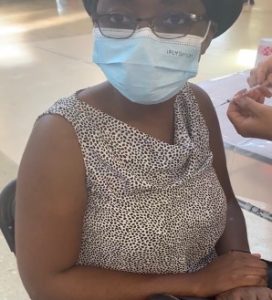Widgetized Section
Go to Admin » Appearance » Widgets » and move Gabfire Widget: Social into that MastheadOverlay zone
COVID-19: Still Tame or Wicked? Both.
The views expressed are those of the author and do not necessarily reflect the views of ASPA as an organization.
By Sombo M. Chunda
August 15, 2021
Introduction

In April 2020, I attended a meeting where some experts wondered if COVID-19 would turn out like the flu and would require us to get an annual vaccination. There was so much uncertainty back then because very little was known about the new disease. A lot has happened. Globally, more than 4 million people have died and infections are in excess of 200 million. Vaccines have been developed, and across the world, people have volunteered to take them. This cooperation in vaccine intake is motivated by many reasons, including but not limited to (i) trust in science, (ii) a genuine personal responsibility towards public health, (iii) a desire to get back to normal life (i.e., life as was before the pandemic), (iv) exhaustion from the isolation from lockdowns, (v) and fear of being extremely sick. In my earlier article, I talked about the duality of COVID-19 exhibiting both wicked and tame problem characteristics. A wicked problem is complex. There is no single solution for it, and it has no stopping rule. A tame problem can be solved. An example of a tame problem is 1+1=2; only one answer exists to this problem. In this article, I revisit the duality of COVID-19 and focus on the situation as of early August 2021.
Still Tame?
The SARS-Cov2, the virus that causes COVID-19, has evolved. The new variant, the Delta variant, is driving cases high in the United States because it is highly transmissible. With the high transmissibility rate, experts suggest that the herd immunity level in the population needed has been pushed up to over 80%. The scientific data suggests that the vaccine is less than 90% effective at stopping infections with delta, and vaccinated people can still spread the virus. However, those who are vaccinated are likely to have mild symptoms once infected with COVID-19. Notwithstanding these new developments, vaccination, wearing masks, washing hands with soap and water or sanitizing as well as social distancing continue to be the proven methods that will help control the spread of new variants.
More Wicked?
The pandemic exposed the massive inequalities that exist in both rich and developing countries. Global financial and economic power imbalances continue to be exposed. Rich countries’ governments borrowed $18 trillion from bond markets in 2020—more than ever before—but their borrowing costs hit a record low due to a big rise in bond purchases by central banks, as well as a lack of concern about public debt levels among private investors. Borrowing rates for countries in Africa were between 5% to 10%, reflecting default risk as headlines of debt distress for poor countries reverberated in various media. South Africa, the country worst hit by COVID-19 in Africa, bought the Oxford-AstraZeneca COVID-19 vaccine at a price of nearly 2.5 times higher than most European countries. Rich countries are not only on record for hoarding vaccines but also will be destroying millions of doses that expire. Vaccine hesitancy continues to be a challenge and with proof of vaccine mandates being implemented, COVID-19 related crimes such as fake vaccine cards are on the rise.
Untangling the Duality: An opportunity for Public Administration?
As scientists continue working to understand the drivers of mutations and devise solutions to handle the tame aspect of COVID-19, public administration has an opportunity for creating a positive impact on the wicked aspect. The public administration solutions should focus on fixing the broken system and restoring trust. It is urgent that global governance systems promote fairness and do not exacerbate the suffering of the poor in poor countries and elsewhere. The world needs systems that support fairer access to finance and ensure that corporations pay their fair share of taxes; systems that will not only blame the poor for the situation that they find themselves in but also interrogate the role that the system has played in creating those conditions for the poor. Systems that will be proactive and not reactive. New ways of thinking are needed going forward.
Conclusion
COVID-19 is still both tame and wicked. The evidence suggests vaccination, wearing masks and social distancing are part of the solution that needs to be embraced to avoid the unwanted state of a mutation more powerful than the Delta variant. Fixing the global public administration system is a matter we must pursue to prepare for future pandemics and give many a chance to live in dignified circumstances. Collaboration across disciplines and countries cannot be overemphasized because of the borderless nature of this war.
Author: Sombo M. Chunda is a Ph.D. candidate in the L. Douglas Wilder School of Government and Public Affairs. Before graduate school, Sombo worked as country manager in Zambia for the Swedish international development organization, Diakonia. She is a 2019 recipient of the Walter W. Mode Scholarship from ASPA. [email protected]; twitter @ChundaSombo


 (4 votes, average: 4.50 out of 5)
(4 votes, average: 4.50 out of 5)
Andrew Mwape
August 16, 2021 at 10:37 pm
Indeed! We need both, and preparation is everything!